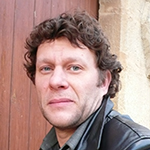Jordi Vidal
Proprietor/Grower/Winemaker
Conreria Scala Dei
Priorat, Spain
Spotlight No. 25
The people of the Priorat have been working the land for generations, but for those who come from outside to participate in the challenges the terroir presents, it is said “the Priorat chooses you.” Jordi Vidal grew up in Barcelona, helping his grandfather in his vegetable garden and wandering the landscape around his father’s village on weekends. He came to wine the way many do, by chance—or the Priorat called him, too. His first job was at a wine shop in Barcelona, and a winemaker who frequented the shop told Jordi about an enology school in Falset.
In 1985, Jordi got on a bus to Falset to learn more about the wine school. It was supposed to be a day trip. His mother expected him home in time for dinner. But upon arrival he was invited to work the harvest in Scala Dei, where the Carthusian monks established their monastery in the Priorat nearly a millennium ago. Jordi had never worked a harvest before and was curious, so he stayed. The guys loaned him some work pants and he jumped right into the vineyards. He enrolled in the enology school, graduated and then went on to get his license of enology at the University of Tarragona and got a job at Torres running the fermentations. Jordi juggled working the harvests and his studies at the university until he graduated in 1990.
Enology degree in hand, Jordi returned to the Priorat and joined two of his friends from those early years in Falset. They pooled their resources and bought some land and a building in the area known as Conreria d’Scala Dei (the community neighboring the monastery that used to take care of the mundane affairs of life for the sequestered monks). The three of them did all the work themselves for many years. Today they have five people working 51 hectares (126 acres) in four regions of the Priorat, all dry farmed and certified organic.
In 2012 Jordi purchased a special one-hectare (2.5-acre) vineyard, Coster del Mario, planted in 1929. Mario’s son was not interested in the vines, so Jordi rented them from him and took care of them for four years, until Mario went to live in a seniors’ home and sold the vineyard to Jordi. Jordi never imagined he would own his own vines. He often thinks of the old man, Señor Mario, working with the vines as Jordi does now. “You have land that seems to offer nothing and yet the vines go on, longer than we do,” says Jordi. He marvels at the fact that “the vines still need us. You cannot control nature, but you can have a good relationship with it.” And the vines thank him generously with their fruit each vintage.
After more than 20 years with the vineyards, Jordi is able to combine the insights of the science he learned in the classroom with his connection to the vineyards to guide him: “The Priorat is extreme. You can’t ignore what is going on in the vineyards. It makes it easier to know them.”
Jordi is living his best life. His family is well and happy. He has his vineyard and he is the boss of a winery in the Priorat. “But not the boss for anything,” he adds with a smile, because his philosophy is to encourage people to be their own boss so they find their own relationship with the vineyards. This made me ask if the vines were the boss. Jordi politely responds, “I don’t know about that!” But he is sure that there is nothing better than giving something to the land, being responsible for nature and seeing it thrive in his care.


